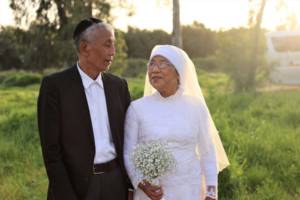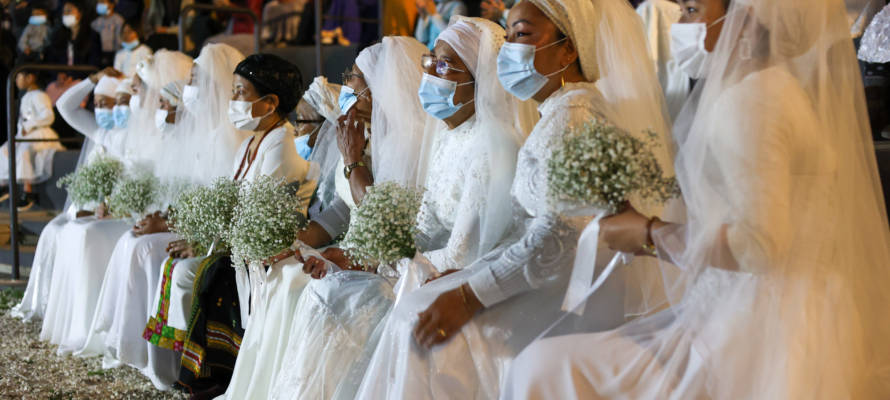“After 49 years we have had the privilege to dress up nicely and get married again, only this time under a Chupah (Jewish wedding canopy) here in the land of our ancestors, the Land of Israel.”
Eleven Bnei Menashe couples, all of whom recently immigrated to Israel from northeastern India, were remarried Wednesday in a festive and emotional group ceremony at Shavei Israel’s absorption center in Nordia, near Netanya, after completing their formal conversion to Judaism by the Chief Rabbinate.
The 11 couples were among 257 new Bnei Menashe immigrants who we brought to Israel in December in partnership with the Minister of Aliyah and Integration Pnina Tamano Shata. The 11 couples hail from the northeastern Indian states of Manipur and Mizoram and plan to settle in the city of Nof HaGalil, formerly known as Upper Nazareth, in the north of Israel.
For the weddings, the brides had their hair and makeup done and wore traditional white wedding gowns while some of the grooms wore traditional suits with Bnei Menashe tribal designs. In light of the Coronavirus situation, the ceremonies were conducted with permission from Israel’s Home Front Command and in accordance with Health Ministry regulations.
Among the couples who remarried were Maccabi Hnamte (72) and Sarah Hnamte (70) from the northeastern Indian state of Mizoram, who have been happily married for 49 years. Their two children made Aliyah to Israel in 2003 and they had not seen them for more than 17 years until their arrival in the Jewish State just two months ago.

Maccabi and Sarah Hnamte, happily married for 49 years, remarry this week in Israel. (Laura Ben-David/Shavei Israel)
“We’re very grateful to make Aliyah and very excited to join our children and grandchildren at last,” the Hnamtes said. “After 49 years we have had the privilege to dress up nicely and get married again, only this time under a Chupah (Jewish wedding canopy) here in the land of our ancestors, the Land of Israel.”
The Bnei Menashe, or sons of Manasseh, claim descent from one of the Ten Lost Tribes of Israel, who were sent into exile by the Assyrian Empire more than 27 centuries ago. Their ancestors wandered through Central Asia and the Far East for centuries, before settling in what is now northeastern India, along the borders of Burma and Bangladesh. Throughout their sojourn in exile, the Bnei Menashe continued to practice Judaism just as their ancestors did, including observing the Sabbath, keeping kosher, celebrating the festivals and following the laws of family purity. They continued to nourish the dream of one day returning to the land of their ancestors, the Land of Israel.
Thus far, Shavei Israel has made the dream of Aliyah, immigration to Israel, possible for over 4,000 Bnei Menashe and plans to help bring more members of the community to Israel. Currently, there are 6,500 Bnei Menashe awaiting their return to the Jewish homeland.
